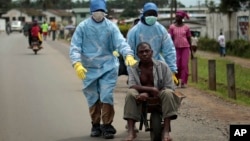Six months after the Ebola outbreak emerged for the first time in an unprepared West Africa and eventually became the worst-ever outbreak, the gap between what is needed and what has been sent by other countries and private groups is huge and threatens to become insurmountable.
Doctors are in short supply, as are hospital beds for patients.
Of the four west African nations affected by the Ebola outbreak, Liberia has been hit the hardest, with 3,458 people infected, and 1,830 of those killed by the disease.
A total of more than 6,500 infections, almost all in Guinea, Liberia and Sierra Leone, have been recorded since the beginning of the year according to a WHO count as of Saturday. Of those, 3,091 people have died so far.
Finding space
Jean-Pierre Veyrenche, in charge of the construction of clinics in Monrovia for the World Health Organization, said the task is especially complicated in the dense Liberian capital, the French news agency AFP reported on Sunday.
"You need 5,000 square meters (54,000 square feet) for a 100-bed clinic - not easy to find in a big city like Monrovia, with marshy terrain. And the heavy rains are an enormous obstacle, as is the high water table which makes it impossible to dig latrines and is forcing us to build septic tanks out of concrete,” Veyrenche said.
Like all NGOs and political leaders, he appealed for more aid workers on the ground.
"I think people are scared," Veyrenche said, "No one knows how to deal with Ebola in an urban zone, and in such numbers. ... But the international humanitarian community must act. There are ways of working here. You can't get Ebola from stepping down onto the runway."
A group of aid workers in Monrovia noted the same problem. "Supplies are coming in, but what we're still missing are health care personnel," one of them told AFP.
Forced to fill in for Liberia’s public health infrastructure, which has been decimated by 14 years of civil war and grinding poverty, all NGO-run Ebola centers in the country are under-resourced and overrun by demand, AFP reported on Sunday.
International effort
International efforts are finally building speed to get critical supplies and staff to stricken nations, following a call for fresh aid by U.S. President Barack Obama, and along with fast-track funding from the International Monetary Fund.
But the United Nations has estimated that nearly $1 billion will be required to effectively fight the disease.
And treatment centers are still sending away patients for lack of space or doctors.
A 160-bed Ebola clinic run in Monrovia by Doctors Without Borders (Medecins Sans Frontieres, MSF) had to turn away patients for days.
A Belgian aid worker, forced to act as a "bouncer" there, quit and returned home, traumatized by the need to turn away the sick and dying, AFP reported.
"A lot of people are saying this is the hardest mission they've ever had," an MSF colleague said, requesting anonymity from AFP.
But the colleague also pointed to progress, saying that "slightly fewer arrivals" since Thursday has meant no one needed to be turned away - "perhaps because new centres have been opened."
Struggle to find hospital bed
Survivors are often left to search for hospital space by themselves.
D.J. Mulbah, 14, was taken by his mother and grandmother on Saturday in desperate pursuit of a coveted bed at the Ebola clinic run by Doctors Without Borders in Monrovia. Too weak to stand, he was put into a taxi with his backpack and a bucket for vomit. Now he lay on the dirt beside the worried women.
Often there is nowhere to take the sick except to “holding centers” where they await a bed at an Ebola treatment facility.
By 8 a.m. Saturday a dozen people who likely have Ebola are crouching and sitting on the ground outside the padlocked metal gates of a facility with a capacity of 160 patients.
Soon a triage nurse approaches, her voice muffled through a surgical mask covered by a plastic face shield. The clinic will take the boy. D.J. manages a faint smile.
Seven of the 30 beds made available Saturday morning were vacated by survivors. The rest had died.
The existing bed capacity for Ebola patients in Liberia, Sierra Leone and Guinea and Nigeria is about 820, well short of the 2,900 beds that are currently needed, according to the WHO.
Recently 737 beds were pledged by countries. Yet even after the promised treatment facilities are built, they will still be at least 2,100 beds short.
The shortage of health workers is also great. WHO has estimated that 1,000 to 2,000 international health workers are needed in West Africa. More than local 200 health workers have died of Ebola trying to save patients, complicating recruitment efforts.
Scarcity of doctors
Doctors Without Borders, which has more Ebola clinics than anyone, currently has 248 foreign aid workers in the region.
Obama has ordered up to 3,000 U.S. military personnel to West Africa to train health workers and build more than a dozen 100-bed field hospitals, including reserved sections for infected aid workers in Liberia.
MSF and other aid workers are distributing home-care kits with gloves and surgical gowns to try and keep those awaiting hospital beds from infecting relatives at home, though only 1,000 of the kits are being distributed in Monrovia, a city of 1.6 million.
Dr. Joanne Liu, international president of Doctors Without Borders, urged world leaders this week to take “immediate action.”
“The reality on the ground today is this: The promised surge has not yet delivered,’ ” she said.
Material for this report provided by AFP and AP.





